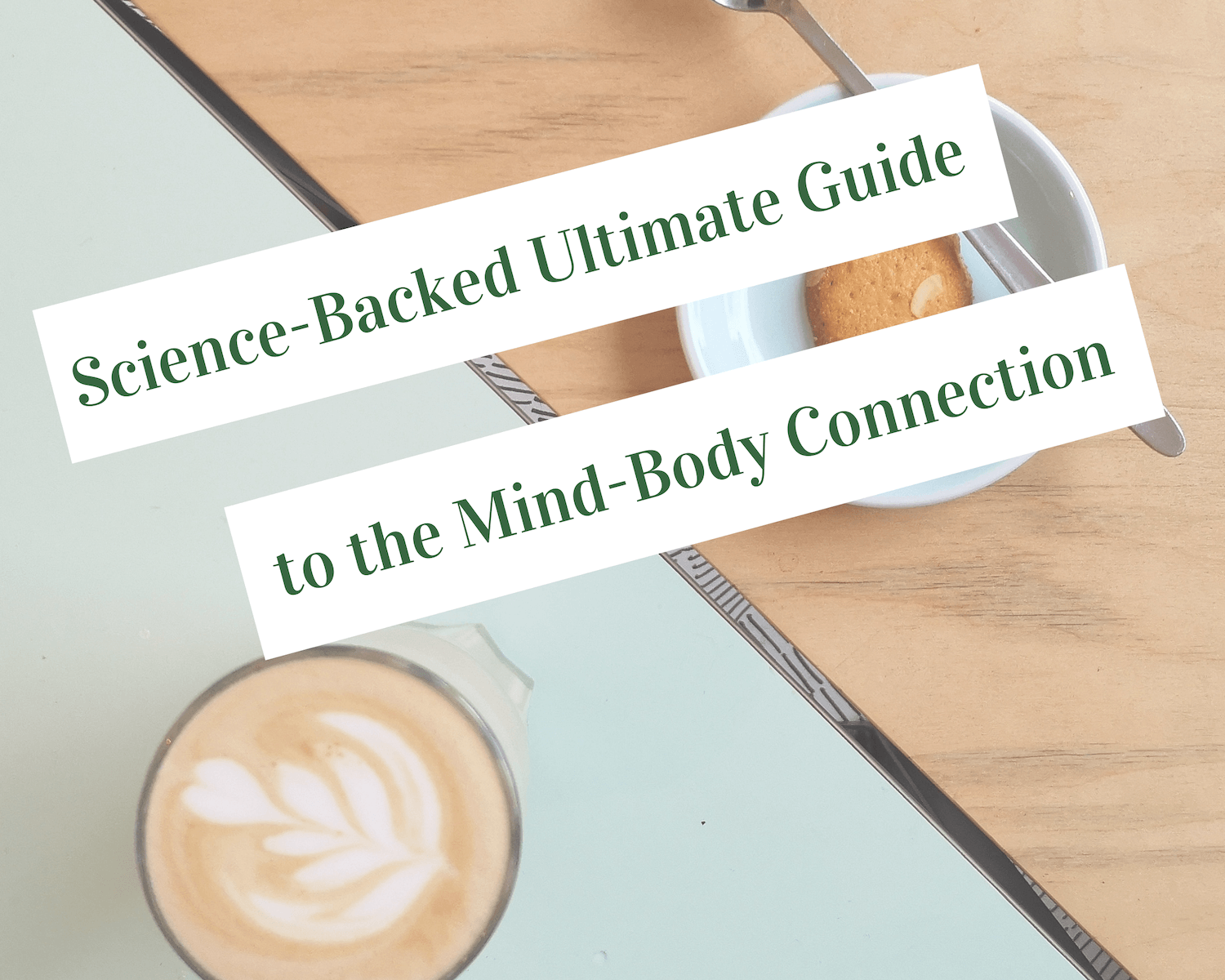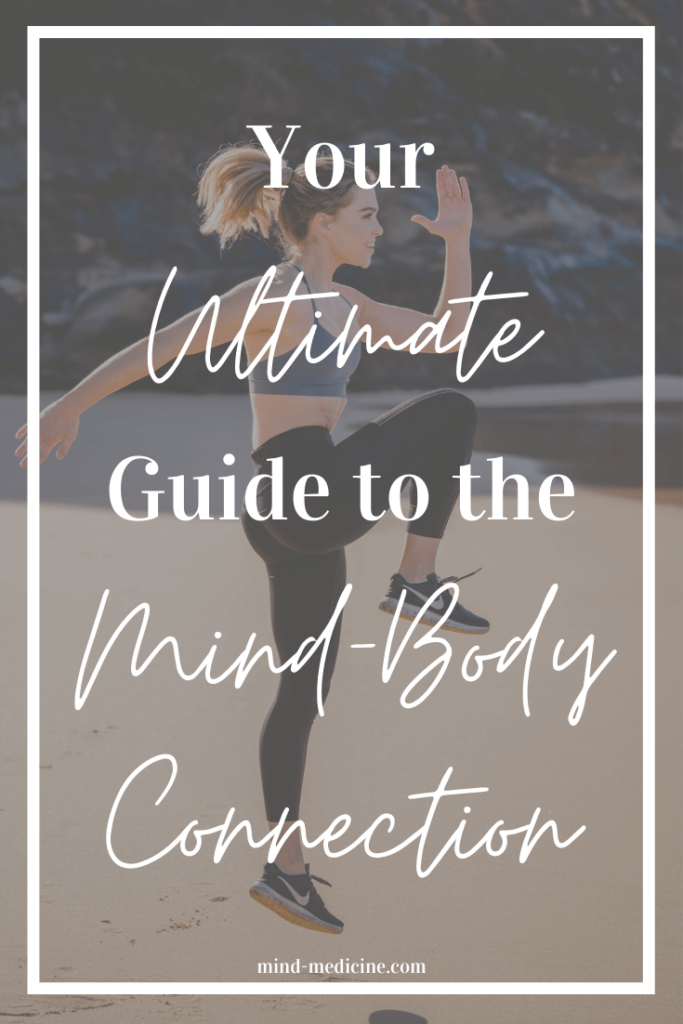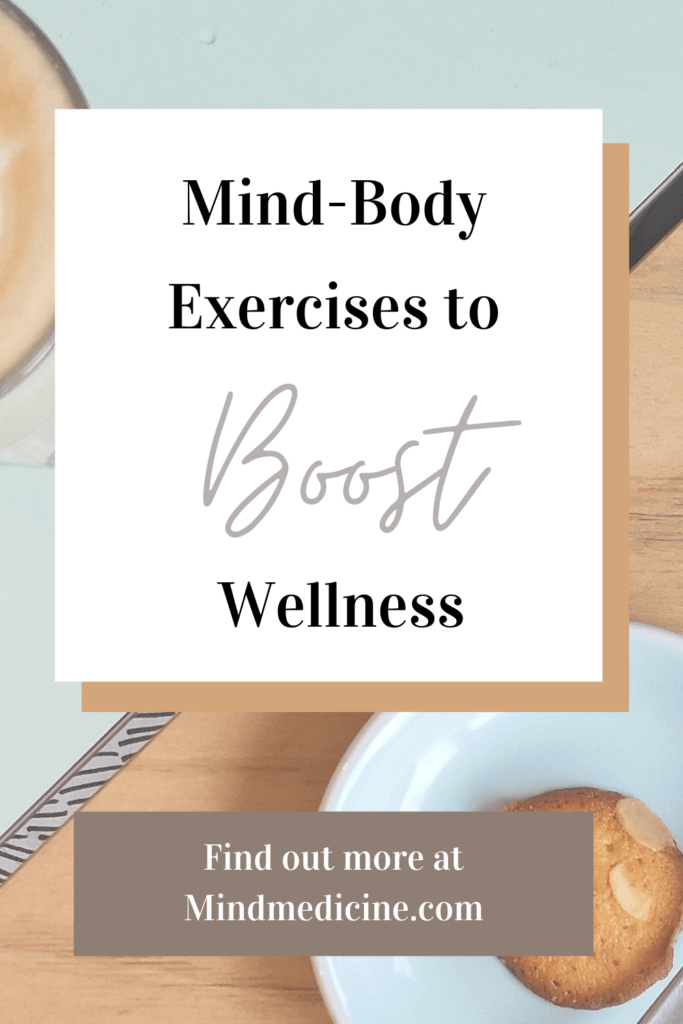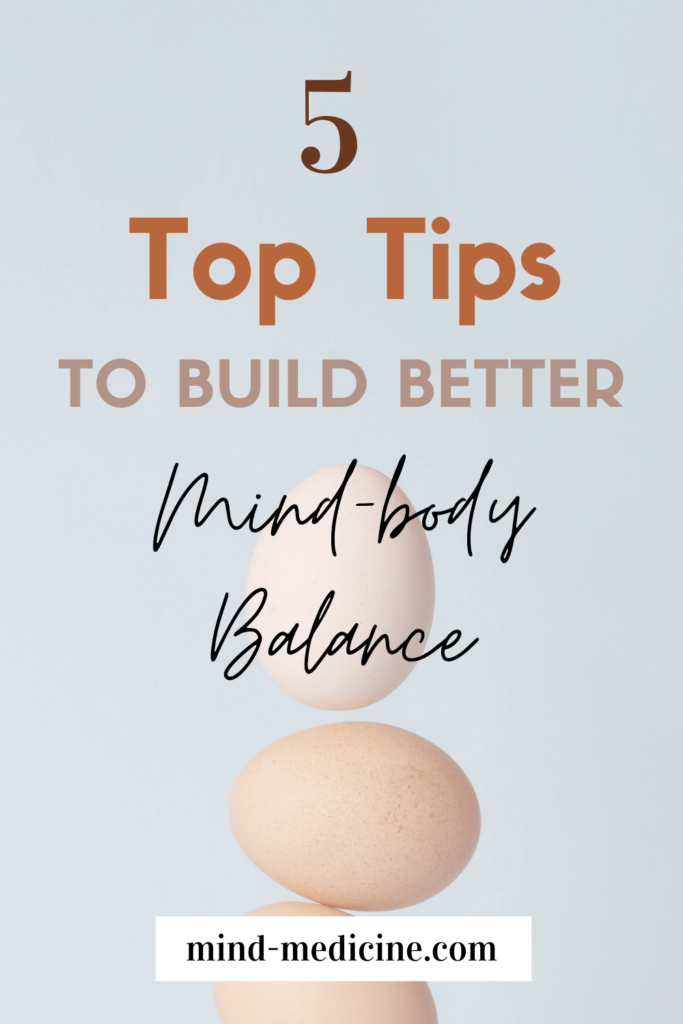Evidence-based tips on how to cultivate a better mind and body balance through mind-body connection techniques
Disclaimer: This post contains affiliate links that I earn a commission from at no cost to you
Did you know that the mind and body are so interconnected they can affect your daily life? Probably not. Most of the time the mind and the body are treated as separate entities, especially in modern medicine. However, knowing and using the mind-body connection to your advantage can dramatically improve your life and your health and wellness.
Most people, when they think of the word healthy they think of healthy food and exercise. However, true health and wellness involve the whole self: mind, body and soul. Not just the typical image you might think of first.
Have you ever suffered migraines or headaches, sleep issues or digestive issues? Of Often, treating these symptoms doesn’t make much difference? It can be due to the distress coming from your mind and manifesting as a physical symptom.
One example that springs to my head are my experience with anxiety. Experiencing my throat tightening, breathing becoming difficult, shaking, and feeling like I would be sick. All of these symptoms were from the struggles in my mind with my limiting beliefs and fear.
Have you suffered from this too?
These experiences and ailments are a result of the mind-body connection and the whole self. I’ve got the practical tips you need to improve your wellness through both your mind and your body.
What is the mind-body connection?
In science class back in school, you are sure to have seen an image of the body and nervous system. This is the physical and obvious connection between the brain and the body. Each thought, action, movement etc. comes directly from the brain, all the way through the nervous system until the physical action is complete.
These messages are sent throughout the body by neurotransmitters. Neurotransmitters are released by the brain after a command and are passed through neurons until the command is complete. This happens for everything in your body, including the small things like blinking your eyes to making you run. The brain is in conscious and unconscious control
In addition, memories are also stored all over the body, not just in the brain.
A study conducted on rats in a maze showed that the rats could complete the same maze even with parts of their brains removed. Even when only the brain stem remained, the rats were able to complete the maze from memory. Proving that memory is stored in the body, at a cellular level.
Traumatic events can also be remembered in the body, even when the memory in your brain isn’t conscious. This is evident when your body reacts negatively to the touch, smell, or taste that it remembers.
One professor of psychology states,
“According to the mind-body or biopsychosocial paradigm… there is no real division between mind and body because of networks of communication that exist between the brain and neurological, endocrine and immune systems”
(source)
There are many ways that the brain communicates with the body and is responsible for health and wellness. Emotions are also a method of communication between the mind and the body.
Emotion is the physiological response to a stimulus. After which, you feel the physical and mental sensations that occur as you internalise and feel the emotion. Therefore, feelings are the physical manifestations of your emotions in response to your thoughts. Clearly showing the connection between the mind and the body through your emotions and the sensations you experience. This is why I physically suffered from anxiety as a result of my thoughts.
In a nutshell, the mind-body connection is the link between your thoughts, emotions, behaviours, and physical symptoms.
The Impacts of the mind-body connection
What kind of impact does this link have on your health and wellness?
Stress and its impacts on the mind and body
Stress is defined as the emotional and mental strain that triggers the release of cortisol. Prolonged exposure to high levels of cortisol has been shown to shrink the prefrontal cortex, the area of the brain responsible for memory. This effect can result in memory impairments in later life.
In addition, stress can kill brain cells and negatively impact synapse regulation. Leading to reduced sociability and lower cognition and understanding. Therefore, impacting your mental health and social wellbeing.
As we know, the mind communicates with the body through many different systems. One of those systems is the immune system. Studies have shown that increased and prolonged stress increased the bodies pro-inflammatory response as well reduces the rate at which we heal.
Stress and emotional distress also increase susceptibility to viral infections as well as cardiovascular disease. This physical response to stress results in more inflammation in the body and a more significant reaction to infection and disease.
Another study researching stress and its effects on the gut proved that stressors disrupt the composition of the enteric microbiota. These are the bacteria that live in your gut and digestive tract. Stress has shown that it reduces the number of friendly bacteria in particular. Resulting in digestive problems, discomfort and potentially, physical pain.
Ultimately, stress impacts the whole body through the mind-body connection.
Emotions and physiology impacts on the mind and the body
“Emotions prepare us for action. The mechanisms of such survival responses rely on numerous synchronized changes in cardiovascular, skeletomuscular, gastrointestinal, respiratory, endocrine and exocrine, and autonomic nervous systems”
(source)
Our emotions affect the whole body, not just our mind. The mind-body connection is responsible for the physiological changes that we experience in our bodies. All in response to the emotion and stimulus we receive.
The way you are feeling is responsible for blood flow, heart rate and especially the release of specific hormones. Including the release of cortisol from feeling stress and emotional discomfort. Therefore, our emotions have the potential to negatively impact our mental and physical health.
Environment and the mind and the body
There is no denying that thinking of the body and mind as exclusive and contained is not completely correct. We exist in a world full of other people, experiences and expectations. These experiences can change how we think, behave, and especially how we feel. Therefore, the environment also should be considered when looking into the mind-body connection.
One example of how the environment impacts the mind and body is in the production of serotonin and melatonin. Serotonin is one of the body’s main neurotransmitters that triggers feelings of fullness and regulates mood. This neurotransmitter is converted to melatonin in darkness to induce sleep.
Modern-day life has caused more people to work indoors under synthetic lighting. This can disrupt your natural serotonin production during the day and therefore, negatively impact melatonin production at night. Making it harder for you to get to sleep and have the restful sleep you need.
In addition, our experience of the environment can trigger emotional and stress responses. Including personal conflicts, internal ruminations, or traumatic events. All having the potential to positively or negatively contribute to your health and wellness through the mind-body connection.
Sleep on the mind and the body
I am a huge advocate for sleep because it is so important for both physical and mental wellness. Sleep is responsible for protecting you from chronic illness like heart disease, regulating blood pressure, and memory storage.
The immune system relies heavily on the quality of your sleep as well. Poor sleep can reduce your natural killer cells by up to 70%! And as part of a communication system in the body, the immune system is one of the most important. Helping to protect you from physical illness as well as regulating immune cells and hormones important for your health.
Techniques to build a better mind-body balance
The mind-body connection can impact your health and wellness in many ways. Cultivating a positive mind-body balance and understanding of the mind-body connection can improve your wellness significantly. The below mind-body exercises will help both your mind and body improve and boost your physical, mental, and emotional wellness.
Meditation and mindfulness
I love talking about meditation and mindfulness because they are such simple exercises to practice during your day. What’s more, there is a lot of research out there that analyses the benefits of meditation and mindfulness.
One such benefit revealed is that mediation has shown to change brain connectivity and reduce the number of inflammatory cells in the body. One of these cells is the biomarker, known as Interleukin-6, which has been related to inflammatory diseases. Including cancers, auto-immune diseases, and Alzheimer’s. Therefore, this mental practice has the potential to improve your physical health through the mind-body connection.
This study compared two groups, one undertaking a relaxation program and the other following a meditation program. Revealing that meditation is much more effective at reducing stress, reducing inflammation, and maintaining longer-lasting positive effects on the mind and body.
In addition, studies comparing the effectiveness of mindfulness intervention concluded that it is even more effective for improving sleep. Results showed that participants of a 6-week mindfulness-awareness practice had improved symptoms of insomnia, depression, and fatigue. Helping to relieve physical symptoms of poor sleep and depression and boost your overall health and wellness.
Another study discovered that –
“meditation also appears to influence the physical shape and size of your brain. Observations of people who have been meditating for eight weeks revealed that grey matter – which facilitates more efficient processing – was denser in areas associated with learning, memory formation, and emotion regulation. But in the amygdala, which is related to feelings of stress, fear, and heightened blood pressure? Decreased grey matter.”
(source)
Isn’t that amazing? Meditation has the potential to change your brain, improve cognition, boost memory, and help you manage your emotions better. Transforming your life completely and improving mental and emotional wellbeing.
How to practice mindfulness and meditation
- 5 minute morning meditation
Long meditations can be difficult to start off with when you are inexperienced. Meditation is a skill and takes practice to build and strengthen over time. You can do this by starting off with 5-minute meditations to get into the habit of sitting still and focusing on your breathing. By starting off slowly, the habit begins to stick and you can gradually increase the time of your meditations.
- Guided meditations
Guided meditations are a great meditation tool to use for both beginners and advanced practicers. Sit in a comfortable position and choose audio that meets the goal you have in mind such a relaxation, gratitude or sleep. Follow the instructions on the guided meditation and focus on the voice.
- Stop and pause
Stop and pause is a mindfulness technique that you can easily practice in your everyday life. When you notice unwanted emotions or thoughts, stop for a second. Pause and process the thoughts and emotions, understanding where they originated and why. This mindfulness technique provides you with time to process and potentially change how you are feeling in that moment.
- Breath anchoring
During meditation, your breath will be your focus and anchor you to the present moment. You can use your breath during your day to make you more conscious and present in your experience. From simple activities like going for a walk to spending time with your children, this mindfulness technique can cultivate a newfound appreciation for life. Helping you to feel every sensation, emotion and thought in your mind and body.
Click here for an in-depth guide to mindfulness meditation for beginners.
Cognitive behavioural therapy
Another mental and emotional therapy shown to improve both the mind and body is CBT. One study revealed that cognitive behavioural stress management interventions decreased cortisol levels and improved immune system function. Helping to reduce stress levels and the negative impact that cortisol has on the body.
Additionally, CBT showed an increase in natural killer cells (part of your immune system) in participants with stage one and two cancer. At the 6 and 10 years follow-ups, fewer of the CBT participants had died. Therefore, proving that behavioural therapy can improve physical health dramatically.
Other physical benefits of cognitive behavioural therapy include improvement in Irritable Bowel Syndrome. Due to the close relationship between the gut and the brain, there is no question that cognitive interventions would help relieve physical symptoms. This has been studied in-depth and proven that improving your mental health through CBT will improve your gut health as well.
How to practice CBT
Traditionally, Cognitive Behavioural therapy is conducted with a trained therapist. This is completed over a number of sessions to help change thought patterns, behaviours, and attitudes. One session will not change you instantly and it can take the time and support you need from a therapist. In addition, a therapist can also help hold you accountable for the action and progress you want to take.
Although, you can practice and implement CBT techniques on yourself for similar results.
Journaling is one such technique. Deep exploration of your thoughts, emotions and past can help you filter through the noise and come to a better understanding of yourself. Stream of consciousness writing can also relieve the mental pressure and overwhelm you can feel from your thoughts. Allowing you to express them, evaluate them and release them on a page.
You also want to explore any cognitive disorders that need to be addressed. From catastrophising, filtering or polarised thinking, there are many ways we are programmed that might be destructive. Journaling can help you identify problem areas or parts of your condition you want to change.
With this information, you can begin to change these patterns through cognitive restructuring. Where you challenge a belief and thought pattern and reframe it. Helping you to hold more empowering beliefs and change the way you think.
Other CBT techniques include visualisation, progressive muscle relaxation, and the mindfulness technique of relaxed breathing.
Why not get started with journaling by using my 50 personal growth journal prompts? Helping you to begin identifying your thought patterns and explore yourself.
Improve sleep
Sleep is responsible for a huge amount of your mental and physical health. Therefore, improving your sleep will have huge benefits to your wellness. Improving your sleep and sleep cycles means you can benefit from more REM sleep. Resulting in you feeling more rested and waking up more energised physically and mentally.
Below are a few techniques you can use to improve your sleep:
As we know, meditation has shown to reduce stress and prevent insomnia. I personally, love using guided meditations before bed as they help me fall asleep faster and sleep more deeply. The focus of sleep meditation is to help[ empty your mind of the days’ events or future events. These kinds of thoughts can lead to overthinking and stop you from falling asleep as you ruminate over and over.
In addition, sleep meditations help to relax your body. Physical tension, pain and discomfort can also prevent you from sleeping and having the restful sleep you need.
- Evening routine
The research mentioned above showed that exposure to too much light, especially in the evenings, can prevent the production of melatonin. This is the hormone needed to induce sleep. Therefore, resulting in restless sleep and insomnia when your body isn’t ready for sleep.
An evening routine can help prepare you physically and mentally for sleep. One main thing to include in your evening routine is turning off devices and potentially lowering your lighting. Therefore, promoting the production of melatonin and helping you sleep much better.
Supplements can also be an addition to your evening and morning routines. A melatonin supplement or 5-htp supplement can increase the presence of melatonin to help you sleep. Other supplements like magnesium, vitamin D, and CBD also contribute to deeper sleep and help to relax your muscles for sleep.
Increased Emotional intelligence
Emotional intelligence is an awareness and understanding of your emotions and thoughts. This is a skill that can be learned and grown throughout your life. Why do I think it’s important? Emotional intelligence is essential for self-understanding and being able to process your emotions effectively.
Being emotionally intelligent and aware is also essential for your health and wellness. Your whole self includes your emotions. Knowing what you are feeling and why can give you incredible information about yourself and your health. You can understand your emotions by knowing the reactions you experience according to various stimulus.
For example, you might experience anger as a result of a colleague at work. Triggering hot flushes, a racing heart and increased breathing. These physical reactions are the physiology of your anger.
“Every emotion you ever feel has specific physiology linked to it: posture, breathing, patterns of movement, facial expressions.” (source) Therefore, when we are in a particular physical state, we can recognise the emotion we are experiencing. This also gives us the power to change how we are feeling.
Changing your physiology of negative emotion to a positive emotion can trigger the positive emotion to manifest. Therefore, changing your emotional state and changing your mental and physical states through the mind-body connection. Helping you to feel better and transform your energy into something more productive and supportive of you and your experience.
Physical health
Improving your physical health, of course, will be extremely important for your wellness. Your body is a huge part of your health and your mind is negatively impacted by poor physical health.
Research suggests that the neural networks in our brains are responsible for the physical effects of stress, anxiety, and depression. Offering a clue as to why stress can be relieved by physical movement and exercise. Therefore, exercise can really help you tap into the mind-body connection and make mental improvements whilst working on your body.
In addition, other studies have seen decreased symptoms of depression with frequent exercise. Helping to boost your mood whilst protecting you from chronic disease and illness through physical movement.
Thankfully, introducing physical movement into your life can be simple. From morning stretches, yoga, and going for walks or more intense exercise like weightlifting or boxing. You can choose whatever works for you, at a time that works for you. Making exercise easy and beneficial for your mind and body.
Strengthen your mind-body connection
Now you know how connected and intense the mind-body connection can be. Do you notice differences in your body and your mind now and in various situations? How are your body and mind feeling right now? Do you notice any connections?
This newfound awareness of your being can open you up to new ways to boost your health. Meaning you are in active pursuit of optimal wellness and better wellbeing. This can result in you going for goals and feeling inspired more than ever before.
Use the above techniques like mindfulness, CBT, exercise and emotional intelligence to enhance your mind-body connection. Knowing that every time you work on your body, you improve your mind. And when you work on your mind, you improve your body and physical health.
The rest is up to you and how you use it to your advantage.
Pin this for later!



